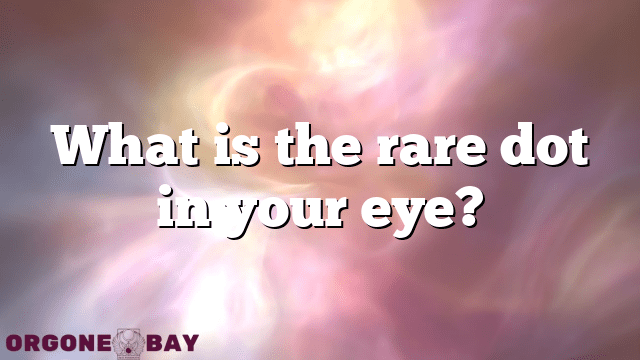Crystal Myths Controversies & Misconceptions
What is the rare dot in your eye?
The rare dot in your eye is commonly known as a floater. Floaters are tiny specks that you often see drifting across your field of vision. These are typically harmless and are suspended in vitreous humor, a jelly-like substance that fills the eyeball and helps maintain its shape and size. However, if you notice a sudden increase in floaters, it could be a sign of damage or a disease that needs to be examined by an eye doctor. Below are some possible causes of floaters:
- Eye injury
- Age-related changes in the eyes
- Diabetes
- Retinal detachment
- Eye inflammation
- Blood vessel disorders
It’s essential to seek medical attention if you experience a sudden increase in floaters, as this could indicate a severe underlying condition that requires urgent treatment. A thorough eye examination by a specialist can determine the cause and severity of floaters and provide appropriate treatment. Therefore, take any significant changes in your vision seriously and schedule a visit to your eye doctor promptly.
Table Of Contents
Understanding Eye Floaters
Eye floaters are small, dark or transparent specks, cobweb-like strands, or squiggly lines that float around your field of vision. They are usually more noticeable when you stare at bright light or plain surfaces such as a white wall or blue sky. However, they may also drift across your eyes at random.
Most people experience occasional floaters which are considered normal and harmless. They are typically caused by tiny clumps of protein or other substances that form in the clear jelly-like substance inside your eye, called vitreous humor. These clumps cast a shadow on your retina, appearing as floaters.
Vitreous Humour: The Jelly-like Substance in Your Eye
Vitreous humor is a clear, gel-like substance that fills the space between the lens and retina of the eye. It plays a crucial role in maintaining the shape and size of the eyeball. It helps the eye maintain its pressure and provides nutrients to parts of the eye that cannot receive blood supply.
As we age, the vitreous humor shrinks and becomes less jelly-like, developing into a more watery consistency. This can cause the clumps of protein or other substances to form and cast shadows on the retina.
Harmless vs. Harmful Floaters
Most floaters are considered harmless and only become problematic if they suddenly increase in number or occurrence. Rapid onset of floaters, especially accompanied by flashes of light, could signify a more severe issue such as a retinal tear or detachment.
Additionally, floaters that resemble showers of tiny dots, especially in one’s periphery, could indicate the presence of inflammation or infection inside the eye. Eye floaters that interfere with your daily activities or vision may also indicate a more serious condition, and medical attention is advised.
When to Seek Medical Advice for Floaters
You should seek medical advice if you experience sudden onset of floaters, especially if accompanied by flashes of light, which could be indicative of a retinal tear or detachment. Additionally, if the floaters interfere with your daily activities or vision, it is crucial to have your eyes examined by an eye doctor.
An eye examination will determine the cause and severity of the floaters. It may involve retinal scans, ophthalmoscopy, and ultrasound imaging to determine if there is any damage or underlying disease inside the eye.
Common Diseases Associated with Eye Floaters
In some cases, eye floaters may be a symptom of an underlying eye disease such as diabetic retinopathy, macular degeneration, uveitis, or posterior vitreous detachment. These conditions could cause floaters or flashing lights, potentially leading to permanent vision loss if left untreated.
Diabetes, high blood pressure, and certain autoimmune diseases that affect the eye may also increase one’s risk of developing eye floaters. Regular eye exams are essential to monitor the health of the eye and detect any underlying disease early.
Prevention and Management of Eye Floaters
While there is no guaranteed way to prevent eye floaters, protecting the eye’s health is crucial. This includes wearing eye protection when working with machinery, staying hydrated to maintain eye fluid levels, and maintaining a healthy diet.
If eye floaters become too bothersome, an eye doctor may recommend a surgical procedure called a vitrectomy, where the vitreous humor is removed from the eye and replaced with a saline solution.
In conclusion, eye floaters are typically harmless unless they suddenly increase in occurrence or interfere with vision. Regular eye exams are vital to detect any underlying diseases or issues with the eye. Maintaining eye health through good habits and healthy practices is also essential in preventing eye floaters.

